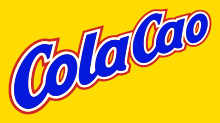Cola Cao
 | |
| Type | Malted dairy drink |
|---|---|
| Manufacturer | Idilia Foods |
| Country of origin | Spain |
| Introduced | 1946 |
| Variants | Cola Cao Original, Cola Cao Turbo, Cola Cao 0%, Cola Cao Noir, Cola Cao Puro, Avenacao, Cola Cao Shake, Cola Cao Shake 0%, Cola Cao Complet, Cola Cao Energy |
| Related products | Nesquik |
| Website | www |
Cola Cao is a sugary chocolate drink with vitamins and minerals that originated in Spain and is now produced and marketed in several countries.[1][2] The brand is owned by the Barcelona-based company Idilia Foods (formerly Nutrexpa).[3][4]
Ingredients[]
Cola Cao is prepared using sugar, processed cocoa, wheat flour and cola nut, and is enriched with vitamins, Calcium and Phosphorus.[2][5]
Preparation[]

Cola Cao comes in a powder form which is intended to be mixed with milk,[1] but can also be mixed with water or soya milk. It can also be added to breakfast cereal or used as a baking ingredient. In Spain in particular, Cola Cao is a popular accompaniment to breakfast,[1] or dinner.
Advertising[]
The "Cola Cao song" used to promote the product in 1952 is a nostalgia item.[1][4] Its first verses are still remembered: "Yo soy aquel negrito del África Tropical / que cultivando cantaba la canción del Cola Cao /..." ("I am that little black guy from Tropical Africa / who sang the Cola Cao song while cultivating").[1][6] The company released a new version of the song in 2020, modifying the lyrics perceived as racist. Cola Cao has been marketed in association with the Olympic Games and other sporting events.[7][6][8]
Distribution[]
Cola Cao in powder form is sold in containers of various sizes, and it is also produced in liquid form that is purveyed in plastic bottles.[1]
Marketing[]
Cola Cao is exported to various countries[6] such as Spain, Portugal, Chile, Bosnia and Herzegovina, and China (known as 高乐高 Gao-le-Gao), where Nutrexpa offices are located.[9] It was introduced to Japan (under the name コラカオ), Russia (under the name Кола Као) and Greece in early 1990s only to be discontinued a few years later, however in 2007 "Cola cao Chocolate Roll Cakes"[10] manufactured in China are sold at dollar stores.
Cola Cao factories have production lines unique to each region:[9]
- European market: Factory in Barcelona, Spain[4]
- Cola Cao Original, Light, Turbo, Fiber, Energy, Complete and more.
- Asian market: Factory in Tianjin, China[12][13]
- Cola Cao Original, Fruit Flavor
- Cola Cao Roll Cake [10]
- Cola Cao Spread
See also[]
- List of chocolate beverages
Footnotes[]
- ^ a b c d e f Howse, C. (2013). The Train in Spain. Bloomsbury Publishing. pp. 20–21. ISBN 978-1-4411-2839-3. Retrieved November 23, 2017.
- ^ a b Dalby, A. (2013). The Breakfast Book. EBL-Schweitzer. Reaktion Books. p. 94. ISBN 978-1-78023-121-1. Retrieved November 23, 2017.
- ^ generico# (October 11, 2017). "Idilia Foods, propietaria de Cola Cao y Nocilla a Valencia". La Vanguardia (in Spanish). Retrieved November 23, 2017.
- ^ a b c Guillén, M. (2005). The Rise of Spanish Multinationals: European Business in the Global Economy. Economía y empresa. Cambridge University Press. pp. 47–48. ISBN 978-0-521-84721-6. Retrieved November 23, 2017.
- ^ "Calories in Cola Cao Chocolate Powder – Calories and Nutrition Facts". MyFitnessPal.com. January 20, 2016. Retrieved November 23, 2017.
- ^ a b c Grant, T. (2008). International Directory of Company Histories. International Directory of Company Histories. St. James Press. p. 285. ISBN 978-1-55862-613-3. Retrieved November 23, 2017.
- ^ McNeill, D. (2005). Urban Change and the European Left: Tales from the New Barcelona. Taylor & Francis. p. 48. ISBN 978-1-134-69794-6. Retrieved November 23, 2017.
- ^ Consumer Goods Europe. Corporate Intelligence on Retailing. 2000. p. 56. Retrieved November 23, 2017.
- ^ a b "Grupo NUTREXPA". Archived from the original on 2007-01-16. Retrieved 2007-04-26.
- ^ a b "Cola Cao y Nocilla, también a València". Levante-EMV (in Spanish). October 11, 2017. Retrieved November 23, 2017.
- ^ World Food Marketing Directory. Euromonitor. 1999. pp. 138–139. Retrieved November 23, 2017.
- ^ Keegan, W.J.; Green, M.C. (2002). Global Marketing Management. Prentice Hall International. Prentice Hall. p. 470. ISBN 978-0-13-033271-4. Retrieved November 23, 2017.
- ^ Mercurio, Richmond (February 29, 2016). "Liwayway Group buys Spain's Cola Cao business in China". Philippine Star. Retrieved November 23, 2017.
External links[]
- Energy drinks
- Chocolate drinks
- Spanish brands
- Products introduced in 1946
